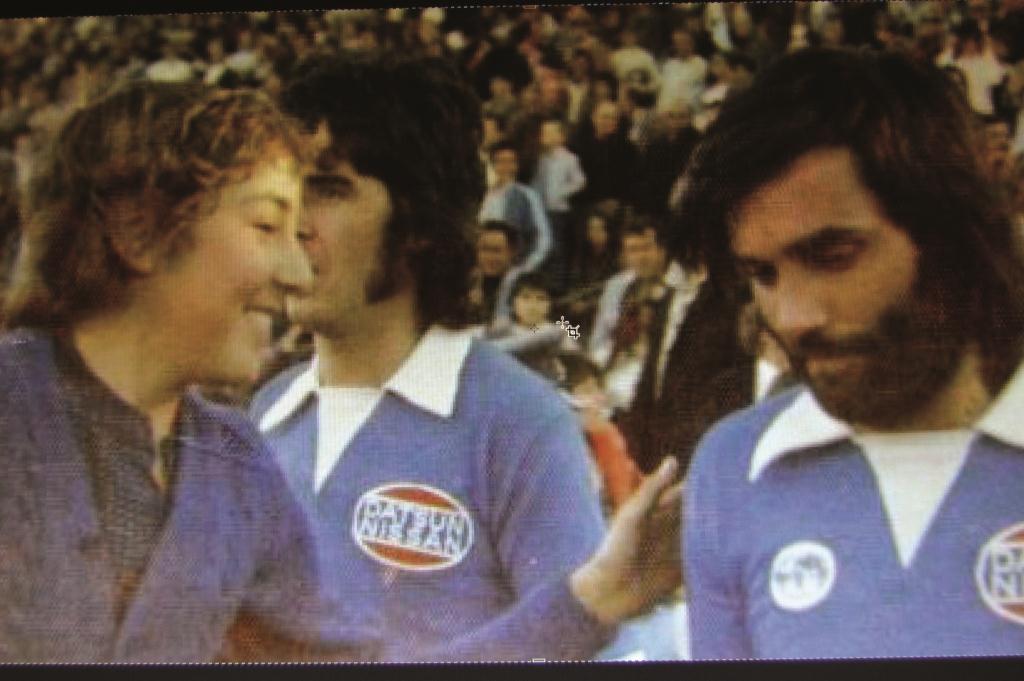It was the moment a golden-haired young fan fought his way through the crowd to touch a genius. One of the few moments, frozen in time, that captures the short and ill-fated career in African football of George Best.
The career of the 1968 European Footballer of the Year was on the slide when Johannesburg team Jewish Guild was looking for stars. In 1974, Jewish Guild, now defunct, had been promoted to the top flight of the then segregated South African game and approached Best with a handful of pounds hoping to secure at least a handful of games.

Football, 1970+s, Manchester United+s George Best jumps up for the ball (Photo by Bob Thomas/Getty Images)
“In the seventies, British players were not making a lot of money, so some came to South Africa in their club’s off seasons to play a few games for the local clubs. This had its advantages for the National Football League, the stadiums were filled up and the game improved,” says Mark Gleeson, a prolific South African football writer and television commentator.
On the day Best was to make his debut in Johannesburg, 14-year-old Herby Opland, a Manchester United fan, woke early determined to meet the star he had merely read of in the newspapers. As young as he was, Opland hitchhiked from Hillbrow, a suburb in Johannesburg, to the Johannesburger Hotel, in Joubert Park, where Best was staying.
Loading...
“It was late morning, I remember walking into the lobby of the hotel, people being rebuffed because they were keeping George Best away from the press. I remember being very excited when the doorman showed sympathy to me; he offered me a place next to him on the bench,” says Opland.
Apparently, Best had invited the doorman to the Jewish Guild bench. The doorman told Opland he should come to the Rand Stadium, in western Johannesburg, for the game in the afternoon.
“I loved every minute. Best was not highly active that day but every time he touched the ball it was like magic. I remember one moment he made an incredible move on the touchline, he chipped the ball straight over a guy and he went around him and headed towards the goals,” remembers Opland.
“I pretty much watched the game from the stand but, minutes before it ended, I jumped over the fence and went up to him, I patted him on the shoulder and walked away. He was not really interested in the fans and media, I think at the time he was doing it for money, his career was in a bit of a dead end.”
A few days after a chance encounter, Opland was surprised to find his picture with Best on the sports pages of The Star newspaper in Johannesburg.
“The photo was my Facebook profile for a long time. I first saw it in the newspaper and because I was such a fan of his, I phoned the newspaper office to say and I would love to have it and the photographer gave me the Kodak photograph,” says Opland, a sub-editor at a Johannesburg television station.

While Best brought excitement to South African football, the Jewish Guild officials were not impressed by missed training sessions. He drank his way out of the club after a mere five games and one goal.
Gleeson asserts Best was at the zenith of his game and refutes allegations Jewish Guild was unhappy with Best’s conduct. It was normal for the export starts to last a few weeks before returning home. Most British footballers did play only a handful games before flying back home.
Best died in November 2005 in London after a lifetime of alcoholism. He was mourned by many fans around the world, including Opland.
“George Best was always a hero, to this day he is still probably my favorite footballer. When it comes to skill, there was no greater genius or
Loading...
